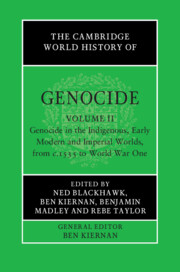Book contents
- The Cambridge World History of Genocide
- The Cambridge World History of Genocide
- The Cambridge World History of Genocide
- Copyright page
- Contents
- Figures
- Maps
- Tables
- Contributors to Volume ii
- Introduction to Volume ii
- Part I Settler Colonialism
- Part II Empire-Building and State Domination
- 4 A Case Lacking Contemporaneous Local Sources
- 5 Atrocity and Genocide in Japan’s Invasion of Korea, 1592–1598
- 6 The English Conquest of Ireland, c.1530–c.1650
- 7 Extirpation and Annihilation in Cromwellian Ireland
- 8 Genocide in the Spice Islands
- 9 ‘Too Furious’
- 10 The Destruction of Wendake (Huronia), 1647–1652
- 11 A ‘Spreading Fire’
- 12 The Qing Extermination of the Zünghars
- 13 A Vicious Civil War in the French Revolution
- 14 The Zulu Kingdom as a Genocidal and Post-genocidal Society, c.1810 to the Present
- Part III Nineteenth-Century Frontier Genocides
- Part IV Premonitions
- Index
8 - Genocide in the Spice Islands
The Dutch East India Company and the Destruction of the Banda Archipelago Civilisation in 1621
from Part II - Empire-Building and State Domination
Published online by Cambridge University Press: 23 June 2023
- The Cambridge World History of Genocide
- The Cambridge World History of Genocide
- The Cambridge World History of Genocide
- Copyright page
- Contents
- Figures
- Maps
- Tables
- Contributors to Volume ii
- Introduction to Volume ii
- Part I Settler Colonialism
- Part II Empire-Building and State Domination
- 4 A Case Lacking Contemporaneous Local Sources
- 5 Atrocity and Genocide in Japan’s Invasion of Korea, 1592–1598
- 6 The English Conquest of Ireland, c.1530–c.1650
- 7 Extirpation and Annihilation in Cromwellian Ireland
- 8 Genocide in the Spice Islands
- 9 ‘Too Furious’
- 10 The Destruction of Wendake (Huronia), 1647–1652
- 11 A ‘Spreading Fire’
- 12 The Qing Extermination of the Zünghars
- 13 A Vicious Civil War in the French Revolution
- 14 The Zulu Kingdom as a Genocidal and Post-genocidal Society, c.1810 to the Present
- Part III Nineteenth-Century Frontier Genocides
- Part IV Premonitions
- Index
Summary
The Spice Islands or the Moluccas in Indonesia are home to an abundance of cloves, nutmeg and mace. The region was historically highly coveted by various foreign merchants Asian and European alike. When the Dutch joined the search for possession of the spices in the region their eye fell on the Banda Archipelago where nutmeg and mace had formed the cornerstone of the Banda civilization of free traders consisting of 15,000 people. The Dutch set out to capture the spices and succeeded in making small encroachments on several of the small islands of the Banda Archipelago in the first decades of the 17th century. In 1621 Jan Pieterszoon Coen the Dutch Governor-General of the Dutch East India Company gave the order to capture the whole of the Banda Archipelago and caused a genocide that destroyed the Bandanese Civilization in the archipelago. In that year many Bandanese elites were killed or enslaved and the Banda population decimated or made to flee into the hills or in the sea where many passed away. Their lands were occupied by the Dutch East India Company who from then on had a monopoly of the nutmeg and mace production in the world.
Keywords
- Type
- Chapter
- Information
- The Cambridge World History of Genocide , pp. 186 - 214Publisher: Cambridge University PressPrint publication year: 2023

